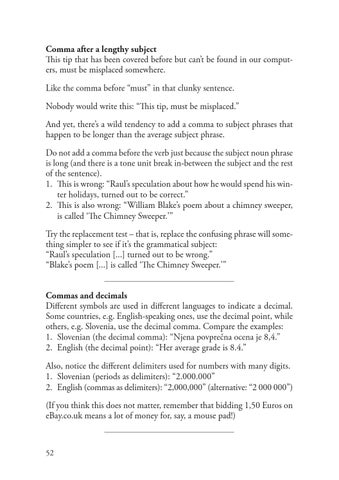Comma after a lengthy subject This tip that has been covered before but can’t be found in our computers, must be misplaced somewhere. Like the comma before “must” in that clunky sentence. Nobody would write this: “This tip, must be misplaced.” And yet, there’s a wild tendency to add a comma to subject phrases that happen to be longer than the average subject phrase. Do not add a comma before the verb just because the subject noun phrase is long (and there is a tone unit break in-between the subject and the rest of the sentence). 1. This is wrong: “Raul’s speculation about how he would spend his winter holidays, turned out to be correct.” 2. This is also wrong: “William Blake’s poem about a chimney sweeper, is called ‘The Chimney Sweeper.’” Try the replacement test – that is, replace the confusing phrase will something simpler to see if it’s the grammatical subject: “Raul’s speculation [...] turned out to be wrong.” “Blake’s poem [...] is called ‘The Chimney Sweeper.’” Commas and decimals Different symbols are used in different languages to indicate a decimal. Some countries, e.g. English-speaking ones, use the decimal point, while others, e.g. Slovenia, use the decimal comma. Compare the examples: 1. Slovenian (the decimal comma): “Njena povprečna ocena je 8,4.” 2. English (the decimal point): “Her average grade is 8.4.” Also, notice the different delimiters used for numbers with many digits. 1. Slovenian (periods as delimiters): “2.000.000” 2. English (commas as delimiters): “2,000,000” (alternative: “2 000 000”) (If you think this does not matter, remember that bidding 1,50 Euros on eBay.co.uk means a lot of money for, say, a mouse pad!)
52
